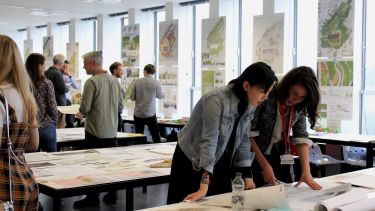Landscape Architecture MA PG Diploma
School of Architecture and Landscape,
Faculty of Social Sciences
-
Start date
September 2025 -
Duration
2 years -
Attendance
Full-time
Explore this course:
Book now for our online postgraduate open day on Wednesday 30 April 2025.

Course description
This is a two-year conversion course for graduates who want to qualify and work as professional landscape architects. Whether you have a background in design or not, it will help you develop the skills needed for modern landscape architectural practice.
The first year provides a thorough grounding in the design, social, technical and scientific aspects of the profession. You’ll learn about the history and theory of landscapes, develop visual and IT skills and tackle a broad range of design projects.
The second year gives you the opportunity to specialise in landscape planning, design or management, or to take a cross-cutting approach combining more than one aspect. During the Final Landscape Project, you’ll work on a landscape architecture solution for a real-world site of your choice.
Accreditation
Postgraduate Diploma in Landscape Architecture is accredited by the Landscape Institute and the International Federation of Landscape Architects.
Modules
Core modules:
- Studio Project 1 - Fundamentals of Landscape Design
-
This module introduces the practice of landscape design. Through a site based project, it introduces methods and procedures of landscape architectural design by taking students through the typical 'design process'. It explores analytical and creative approaches to design and introduces how the fundamental components of landscape design-landform, vegetation, water and hard material-are used to create places that benefit both people and nature. Landscape media, tools and sources are introduced and applied, and lectures on design theory and the materials of landscape support the project. Assessment is through a portfolio that demonstrates the student's design process and resolved design proposals.
30 credits - Landscape Humanities 1 - History and Practice of Landscape Architecture
-
This module focuses on the cultural and social dimensions of the design of exterior spaces through lecture series. Understanding the human needs and aspirations associated with the shaping of exterior space is of particular importance for landscape architects. The lectures will explore issues such as the development of landscape design over the course of human history and contemporary, social issues of landscape design practice.
15 credits
Students will explore specific topics related to cultural and social issues which historically and currently underlie landscape through a research paper relating to the human dimension of landscape architectural design. - Landscape Technology 1 - Landscape Materiality
-
This module introduces students to the fundamental concepts associated with the materiality of landscape, how materials are commonly used in design practice, how landscape architects specify these materials in projects and how landscape architects communicate their spatial arrangement and configuration through appropriate detailed drawings. The module will explore key aspects of the landscape architecture profession, including how to design the landscape to provide benefits for both humans and the broader natural environment through the considered use of a range of vegetation, and hard materials with the aim of shaping and managing fundamental markers of landscape space, including water, sky, and animal life (including humans).
15 credits - Studio Project 2 - Fundamentals of Landscape Planning and Urban Design
-
This module serves as an introduction to and exploration of several core methods, concepts and contexts for contemporary landscape architectural planning and urban design, and more advanced studies in strategic large scale design. Through an integrated project, the use of methods and approaches to strategic landscape planning applied in the first half of the project inform an urban landscape design proposal developed in the second half, relating landscape space to existing and proposed architectural and built form to create a climate resilient urban public realm. The studio project will include research, survey and analysis used to inform creative strategic and design processes. The studio work is complemented by lectures, workshops, and seminars.
30 credits - Landscape Humanities 2 - History and Practice of Landscape and Urban Planning
-
This module examines the cultural, social and historical aspects of landscape design and planning at the macro-scales of landscape planning and urban design, including how the larger landscape, communities and whole cities have been conceived, planned and managed.
15 credits
These issues will be addressed through lectures exploring the historical development of the larger landscape - both rural and urban - as both a planned and unplanned artefact of human activity. Sociological and demographic questions will also be addressed with the aim of seeing how individuals and groups can react to larger trends to create more just and sustainable communities. - Landscape Technology 2 - Landscape Ecology and Infrastructure
-
This module will investigate the relationships, processes, and flows of energy, material, and information, which are fundamental for knowing where and how to intervene to create positive outcomes. This will include exploration of the science of ecology to investigate the macro-scale relationships between organisms and their environment at multiple scales. The human dimensions at this scale will be considered through the understanding of various constructed infrastructures and networks. The module will explore ways to address current challenges including holistic and hybrid understanding, where constructed infrastructure can be reconsidered to facilitate healthier ecological processes and where the natural world is seen as a complex 'system', the proper functioning of which underpins the success of all species, including our own, placing humans as a part of nature, not separate from it.
15 credits - Landscape Research as Creative Practice
-
This module will introduce students to landscape research as a creative practice in order to address questions and challenges relating to current landscape practice, setting the stage and supporting preparation for further research through the Final Landscape Project in the Spring semester and, for MA students, through the Landscape Dissertation. Students will learn how to find sources of information, how to critically review and analyse this information and how to use and present the findings from this research. They will understand the relevance of research to their own project outputs and how research and evidence-based practice can underpin the planning, design and management of the landscape more generally. They will appreciate how research enables them to critically appraise a project and how they can inform, inspire and enrich their own work with the knowledge and insights gained from their research.
15 credits - Professional Skills and Technologies
-
This module offers intermediate or advanced level training in a variety of specific skills sought by contemporary landscape practices and responds to the requirements of the professional accreditation body (Landscape Institute). It also draws from current professional practice requirements in liaison with alumni and professional practitioners to develop a suite of training workshops to ensure that students are well equipped to respond to the needs of the profession and for finding employment.
15 credits
Recognising the diverse backgrounds and interests of students on the programme, a suite of options is offered and students will select the options which align most closely with their interests or which fill gaps in their prior training. The outputs of these workshops, as well as work undertaken in previous semesters and/or in previous employment, are arranged into a personalised portfolio of work suitable for employment applications. - Advanced Landscape Research and Dissertation Preparation
-
This module will build on students' learning in 'Landscape Research as Creative Practice', undertaken in the Autumn semester. It will support students in the exploration of independent research topics in preparation for their dissertation, potentially aligned with and growing out of their Final Landscape Project, undertaken concurrently. The module will provide opportunities for students to identify their area of research, key literature and appropriate methods of inquiry including research ethics, and will prepare them to undertake original research over the summer through the Landscape Dissertation.
15 credits - Professional Practice of Landscape Architecture
-
This module provides students with an introduction to elements of the landscape profession that they are required to understand in order to become practising landscape architects and, in time, Chartered Members of the Landscape Institute. Three broad subject areas are covered: Professional Practice, Landscape and Environmental Law, and Landscape Contracts. These will touch upon issues related to working as a professional landscape architect, relevant landscape and environmental law and contract law as it applies to the practice of landscape architecture and the nature, forms and use of contracts in the landscape profession.
15 credits - Final Landscape Project
-
The Final Landscape Project aims to develop students' readiness to enter the profession by completing a largely independent project from start to finish to a professional standard. Through close collaboration with academic tutors and in parallel with a defined tutorial group, the final project aligns with a chosen design, planning, or management 'agenda' put forth by department tutors. This therefore aims to push the boundaries of the landscape disciplines through research design. As such, the final project undertaken in the Spring semester grows out of focused research into a specific topic already undertaken in the Autumn semester.
30 credits
The aim of the project is to demonstrate the ability to integrate the knowledge and skills acquired in the programme and to apply these in an appropriate way to address the issues posed by the chosen project. Aligned with their tutors' agenda or research question, with the tutor acting as a client or consultant, students will manage their time and develop their required tasks and outputs independently. - Landscape Research Dissertation
-
This module provides students studying for their MA in Landscape Architecture with the experience of undertaking research into an issue of significance to landscape architecture. It builds on the skills and knowledge students develop in the 'Advanced Landscape Research and Dissertation Preparation' module and requires the investigation of a selected topic using appropriate research methods and the production of a 12,000 word dissertation. For certain types of dissertation a reduction in word length may be offset by the use of other media. Students receive tutorial support from an academic advisor.
60 credits
Optional modules - choose two from:
- Advanced Landscape Design - Conceptual and Strategic
-
This module offers options for students to develop a creative, original, and appropriate response to a hypothetical or real site-scale landscape related project which might be encountered in practice. While various scales should be considered, there will be a particular focus on conceptual and strategic exploration of key issues related to landscape architecture design, which might include themes such as 'Sustainable Landscape Design', 'Design with Water' or 'Design for Climate Change'. Students will explore concepts and strategies to develop advanced and original landscape design proposals. Students are encouraged to be innovative and experimental in both the design response and their visual representation, while at the same time demonstrating good judgement in terms of project feasibility as well as social and environmental responsibility. A specific site and brief will be presented at the start of the module.
15 credits - Advanced Landscape Planning - Global Issues
-
This module offers options for students to develop an informed, coherent, and rational response to a particular landscape planning challenge and context, demonstrating a high level of sensitivity to, and understanding of, the underlying environmental, social and political dynamics. While many scales should be considered, the emphasis is on establishing a set of recommendations, policies and/or guidelines for future development under various scenarios indicating the character of potential interventions in complex real or hypothetical contexts. Students will explore global issues related to landscape planning, which might include themes such as 'Nature Based Solutions', 'Integrated Water Management' or 'Urban Heat Island'. Recommendations should be based on a sound methodology and should be communicated in a clear, coherent, succinct and accessible way comprehensible both by other landscape professionals and by the broader public. A specific brief will be presented at the start of the module.
15 credits - Advanced Landscape Management - Managing for Change
-
This module offers options for students to understand specific management principles and guidelines based on the constraints and challenges of a specific real or hypothetical site, study area or type of environment. The emphasis will be on exploring social change, climate change and ecological change considering a variety of landscape scales, developments and spatial patterns. Responses should demonstrate an understanding of landscape management and how these might change or develop over time, showing sensitivity to the ecological, social and political dynamics currently at play. A specific study area and brief will be presented at the start of the module.
15 credits - Advanced Landscape Design - Materiality of Landscape
-
This module offers options for students to develop a creative, original, and appropriate response to a hypothetical or real site-scale landscape related project which might be encountered in practice. While various scales should be considered, there will be a particular focus on detailed landscape design proposals. Students will explore qualities and materiality of landscape spaces through creative and original outputs. The exploration might include considerations related to 'Materiality and Identity', 'Environmental Impact' or 'Sensory Experiences'. Students are encouraged to be innovative and experimental in both the design response and proposals as well as their visual representation, while at the same time demonstrating good judgement in terms of project feasibility as well as social and environmental responsibility. A specific site and brief will be presented at the start of the module.
15 credits - Advanced Landscape Planning - Local Engagement
-
This module offers options for students to develop an informed, coherent and rational response to a particular landscape planning challenge and context, demonstrating a high level of sensitivity to, and understanding of, the underlying environmental, social and political dynamics. The emphasis is on establishing a set of recommendations, policies and/or guidelines for future development under various scenarios, indicating the character of potential processes and responses in complex real contexts. The exploration focuses on local communities engagement and inclusive planning processes, which might include themes such as 'Active Participation', 'Empowerment' or 'Long Term Engagement'. Recommendations should be based on a sound methodology and should be communicated in a clear, coherent, succinct and accessible way comprehensible both by professionals and the broader public. A specific brief will be presented at the start of the module.
15 credits - Advanced Landscape Management - Stewardship
-
This module offers options for students to develop maintenance principles and a set of guidelines based on the constraints and challenges of a specific real project site. Students are encouraged to be innovative and experimental in their exploration of the stewardship of a specific site, in order to respond to the challenges presented by social change, climate change and environmental change with an emphasis on long term solutions and stewardship. Responses should demonstrate an understanding of practical processes and solutions taking into account the specificity of a wide range of landscapes, showing sensitivity to the ecological, social and political dynamics currently at play and anticipating how these might change in the future. A specific site and brief will be presented at the start of the module
15 credits
The content of our courses is reviewed annually to make sure it's up-to-date and relevant. Individual modules are occasionally updated or withdrawn. This is in response to discoveries through our world-leading research; funding changes; professional accreditation requirements; student or employer feedback; outcomes of reviews; and variations in staff or student numbers. In the event of any change we will inform students and take reasonable steps to minimise disruption.
Open days
Become part of our community of talented postgraduate taught students. Register now to join us at our online open day on Wednesday 30 April 2025.
Duration
2 years full-time
Teaching
There are lectures, seminars, workshops, tutorials, critical feedback sessions, site visits and practicals.
Teaching and learning take place in the studio and on site.
Assessment
You’re assessed on coursework assignments, dissertation, oral presentation and examination.
Your career
Our graduates go on to have varied and rewarding careers all around the world. We have alumni working in over 70 countries; both in the private sector, running their own companies and for public and voluntary organisations, helping to improve local communities.
Our alumni include those who have achieved the highest levels of recognition within the Landscape profession, including a former President of the Landscape Institute and President of the International Federation of Landscape Architects.
If you don’t take up a career in landscape, you’ll still be highly employable. By developing valuable transferable skills like graphic design, project management and communication, you’ll be able to make a lasting and positive impact wherever your career takes you.
School
School of Architecture and Landscape
Landscape architecture is about the design, planning and management of places that benefit people and nature. Landscape architects create spaces between buildings that are both inspirational and functional.
If you have a flair for creativity and a passion for improving the environment and people's lives, then landscape architecture could be for you.
You'll learn from experts who are involved in some of the most exciting landscape design work in the world today.
91Ö±²¥ is a dynamic city and an ideal place in which to study landscape architecture. Its changing face has been shaped by school-led initiatives like Grey to Green and Love Square, which give students the chance to be involved with live projects and see the difference landscape architecture can make.
91Ö±²¥ combines the urban with awe-inspiring views of the neighbouring Peak District, making it a rich learning and research environment.
Entry requirements
Minimum 2:1 undergraduate honours degree in a relevant subject.
Subject requirements
We accept degrees in the following subject areas:
- Architecture
- Ecology
- Engineering
- Fine Arts
- Geography
- Geology
- Landscape Architecture
We may also consider related degree titles.
English language requirements
IELTS 6.5 (with 6 in each component) or University equivalent
You will be asked to submit an electronic portfolio to support your application.
If you have any questions about entry requirements, please contact the school/department.
Fees and funding
Alumni discount
Save up to £2,500 on your course fees
Are you a 91Ö±²¥ graduate? You could save up to £2,500 on your postgraduate taught course fees, subject to eligibility.
Apply
You can apply now using our Postgraduate Online Application Form. It's a quick and easy process.
Contact
Any supervisors and research areas listed are indicative and may change before the start of the course.
Recognition of professional qualifications: from 1 January 2021, in order to have any UK professional qualifications recognised for work in an EU country across a number of regulated and other professions you need to apply to the host country for recognition. Read and the .




